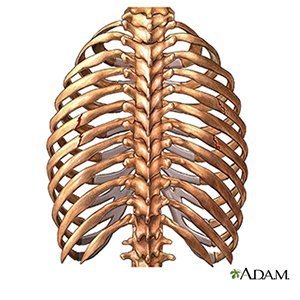The originating document has been archived. We cannot confirm the completeness, accuracy, or currency of the content.
Rib Fracture
Medically reviewed by Drugs.com. Last updated on Feb 21, 2024.
A rib fracture is a crack or break in a rib bone. Your ribs are the bones that connect from the front of your chest around to your spine (backbone). All of the bones of your ribs make your rib cage.
 |
WHILE YOU ARE HERE:
Informed consent
is a legal document that explains the tests, treatments, or procedures that you may need. Informed consent means you understand what will be done and can make decisions about what you want. You give your permission when you sign the consent form. You can have someone sign this form for you if you are not able to sign it. You have the right to understand your medical care in words you know. Before you sign the consent form, understand the risks and benefits of what will be done. Make sure all your questions are answered.
An IV
is a small tube placed in your vein that is used to give you medicine or liquids.
A ventilator
is a machine that gives you oxygen and breathes for you when you cannot breathe well on your own. An endotracheal (ET) tube is put into your mouth or nose and attached to the ventilator. You may need a trach if an ET tube cannot be placed. A trach is a tube put through an incision and into your windpipe.
Vital signs:
Caregivers will check your blood pressure, heart rate, breathing rate, and temperature. They will also ask about your pain. These vital signs give caregivers information about your current health.
Medicines:
- Medicines to treat pain, swelling, or fever: These medicines are safe for most people to use. However, they can cause serious problems when used by people with certain medical conditions. Tell caregivers if you have liver or kidney disease or a history of bleeding in your stomach.
- Epidural anesthesia: This is medicine put into your spine to block pain. This is used if you have severe pain that does not get better with oral pain medicines. Epidural anesthesia is put into your back through a tiny tube. The tube may be left in place to give you more medicine at another time if needed.
- Intercostal nerve block: This is pain medicine that will make you numb for about 6 hours. It is given as a shot between 2 of your ribs in the fracture area. You may need this if your pain continues or is getting worse even after you take oral pain medicines.
Treatments:
- Deep breathing and coughing: Deep breathing helps open the air passages in your lungs. Coughing helps bring up mucus from your lungs. You can deep breathe and cough on your own or with the help of an incentive spirometer.
- Take a deep breath and hold the breath as long as you can. Bracing your ribs with your hands or a pillow while you take the deep breaths can help decrease the pain. Then push the air out of your lungs with a deep, strong cough. Take 10 deep breaths in a row every hour that you are awake, even during the night. Remember to follow each deep breath with a cough. Put any sputum that you have coughed up into a tissue and throw it away.
- An incentive spirometer can help you take deeper breaths. Put the plastic piece into your mouth and take a steady, deep breath in. Hold your breath as long as you can, and then exhale (breathe out). Use your incentive spirometer 10 times every hour that you are awake, even during the night.
- Physical therapy: A physical therapist teaches you exercises to help improve movement and strength, and to decrease pain.
- Surgery: If many of your ribs are badly fractured, you may need surgery. Surgery is often needed for a flail chest. Broken ribs may be held together with plates and screws. An injury to an organ, nerve, or blood vessel may also be treated with surgery.
RISKS:
You may bleed or get an infection if you have surgery. You may get a blood clot in your leg or arm. The clot may travel to your heart or brain and cause life-threatening problems, such as a heart attack or stroke. Without treatment, you may get an infection in your lungs or blood. Air or blood may also collect inside your chest after a rib fracture and cause increased trouble breathing. When this happens, you may need a drain put into your chest to remove the air or blood. Life-threatening injuries may also be present with a rib fracture. These may include injuries to your organs such as your heart, lungs, liver, and spleen.
CARE AGREEMENT:
You have the right to help plan your care. Learn about your health condition and how it may be treated. Discuss treatment options with your caregivers to decide what care you want to receive. You always have the right to refuse treatment.Further information
Always consult your healthcare provider to ensure the information displayed on this page applies to your personal circumstances.
